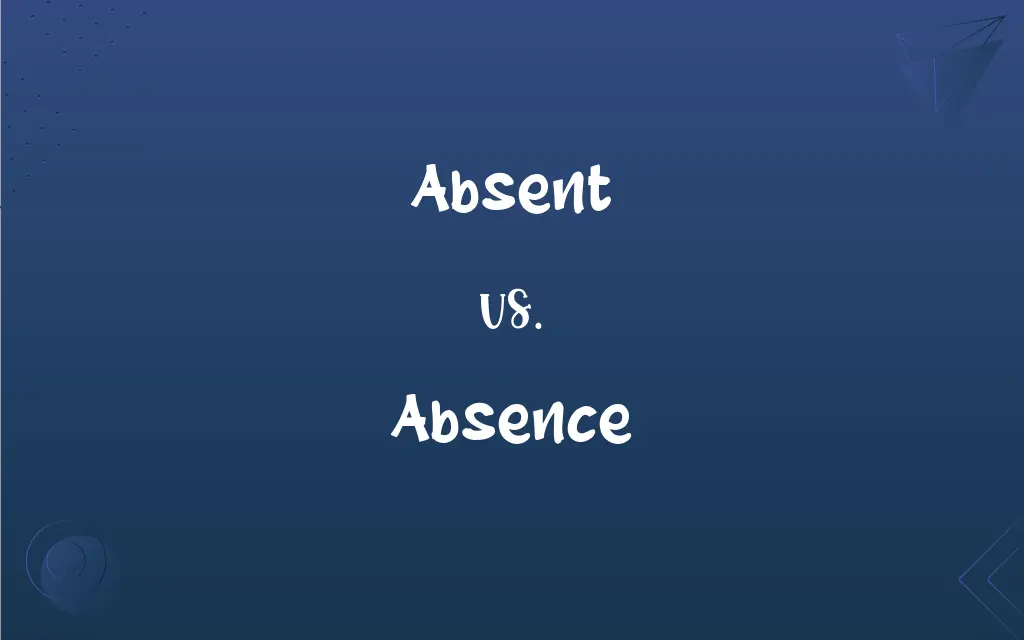Absent vs. Absence: What's the Difference?
Edited by Aimie Carlson || By Harlon Moss || Updated on October 26, 2023
Absent means not present; missing. Absence means the state of being away or not present.

Key Differences
Absent refers to someone or something not being present in a particular place or situation. It is an adjective. While, absence is used to describe the state or condition where someone or something is not present. It is a noun.
Absent is often used to describe a person who is not at a place where they are expected to be. On the otrher hand, absence is used to refer to the period or duration during which someone or something is not present.
Absent can also be used in a more figurative sense, indicating a lack of something, such as "absent of emotion." In contrast, absence is less likely to be used figuratively and typically refers to physical non-presence.
"Absent" can function as a verb in some cases, meaning to keep oneself away, as in "to absent oneself from a meeting." The term "absence" does not function as a verb.
Absent is sometimes used in legal or formal contexts, as in "absent any evidence to the contrary." However, absence is commonly used in contexts like education and employment to denote the non-attendance of an individual.
ADVERTISEMENT
Comparison Chart
Part of Speech
Adjective (sometimes verb)
Noun
Usage
Describes a person or thing not present
Describes the state of being away
Context
Can be used figuratively and legally
Typically used for physical non-presence
Form
Cannot be pluralized
Can be pluralized (absences)
Common Associations
"Absent-minded," "absent from school"
"Leave of absence," "marked your absence"
ADVERTISEMENT
Absent and Absence Definitions
Absent
Not in a certain place at a given time.
John was absent from the meeting yesterday.
Absence
A period of time when someone is not present.
His absence from work lasted two weeks.
Absent
Away or not engaged.
The teacher is absent due to illness.
Absence
A gap or void where something is missing.
The wall had an absence where a painting once hung.
Absent
Not attentive or focused.
He seemed absent during the lecture.
Absence
Lack or deficiency of something.
The absence of evidence made the case difficult.
Absent
Not existing; devoid of.
The room was absent any furniture.
Absence
The state of being away or not present.
Her absence from the party was noticeable.
Absent
Lacking or missing.
The painting was absent of any bright colors.
Absence
The nonexistence or lack of something.
The absence of noise was eerie.
Absent
Not present; missing
Absent friends.
Absent parents.
Absence
The state of being away.
FAQs
Can "absent" be pluralized?
No, as an adjective, "absent" cannot be pluralized.
Can "absent" mean lacking something?
Yes, "absent" can indicate a lack or absence of something.
Is "absent" used for people, objects, or both?
"Absent" can be used for both people and objects.
Is "absent" used in legal contexts?
Yes, "absent" is often used in legal and formal contexts.
Can "absence" refer to the lack of something other than presence?
Yes, it can indicate a deficiency or lack of something.
Is "absent" ever used figuratively?
Yes, "absent" can be used figuratively, as in "absent of emotion."
Does "absence" ever function as a verb?
No, "absence" is strictly a noun.
What is an example of "absence" used in a sentence?
"His prolonged absence raised concerns."
Is "absence" used in formal contexts?
Yes, "absence" is often used in formal, educational, and employment contexts.
Can "absence" indicate a void or gap?
Yes, "absence" can indicate a gap where something is missing.
What is an example of "absent" used in a sentence?
"She was absent from school due to illness."
Is "absence" typically used to describe physical non-presence?
Yes, it usually refers to physical non-presence.
What part of speech is "absence"?
Absence is a noun.
Can "absent" describe inattentiveness?
Yes, as in "absent-minded."
What part of speech is "absent"?
Absent is primarily an adjective, but can also function as a verb.
Can "absent" function as a verb?
Yes, in some cases, as in "to absent oneself from a meeting."
What is the difference between "absent" and "absence"?
"Absent" is an adjective or verb describing non-presence, while "absence" is a noun referring to the state of being away.
Are "absent" and "absence" interchangeable?
No, they are not interchangeable due to their different grammatical roles.
Can "absence" be pluralized?
Yes, "absence" can be pluralized as "absences."
Does "absence" refer to a period of time?
Yes, "absence" can refer to a period when someone or something is not present.
About Author
Written by
Harlon MossHarlon is a seasoned quality moderator and accomplished content writer for Difference Wiki. An alumnus of the prestigious University of California, he earned his degree in Computer Science. Leveraging his academic background, Harlon brings a meticulous and informed perspective to his work, ensuring content accuracy and excellence.
Edited by
Aimie CarlsonAimie Carlson, holding a master's degree in English literature, is a fervent English language enthusiast. She lends her writing talents to Difference Wiki, a prominent website that specializes in comparisons, offering readers insightful analyses that both captivate and inform.































































